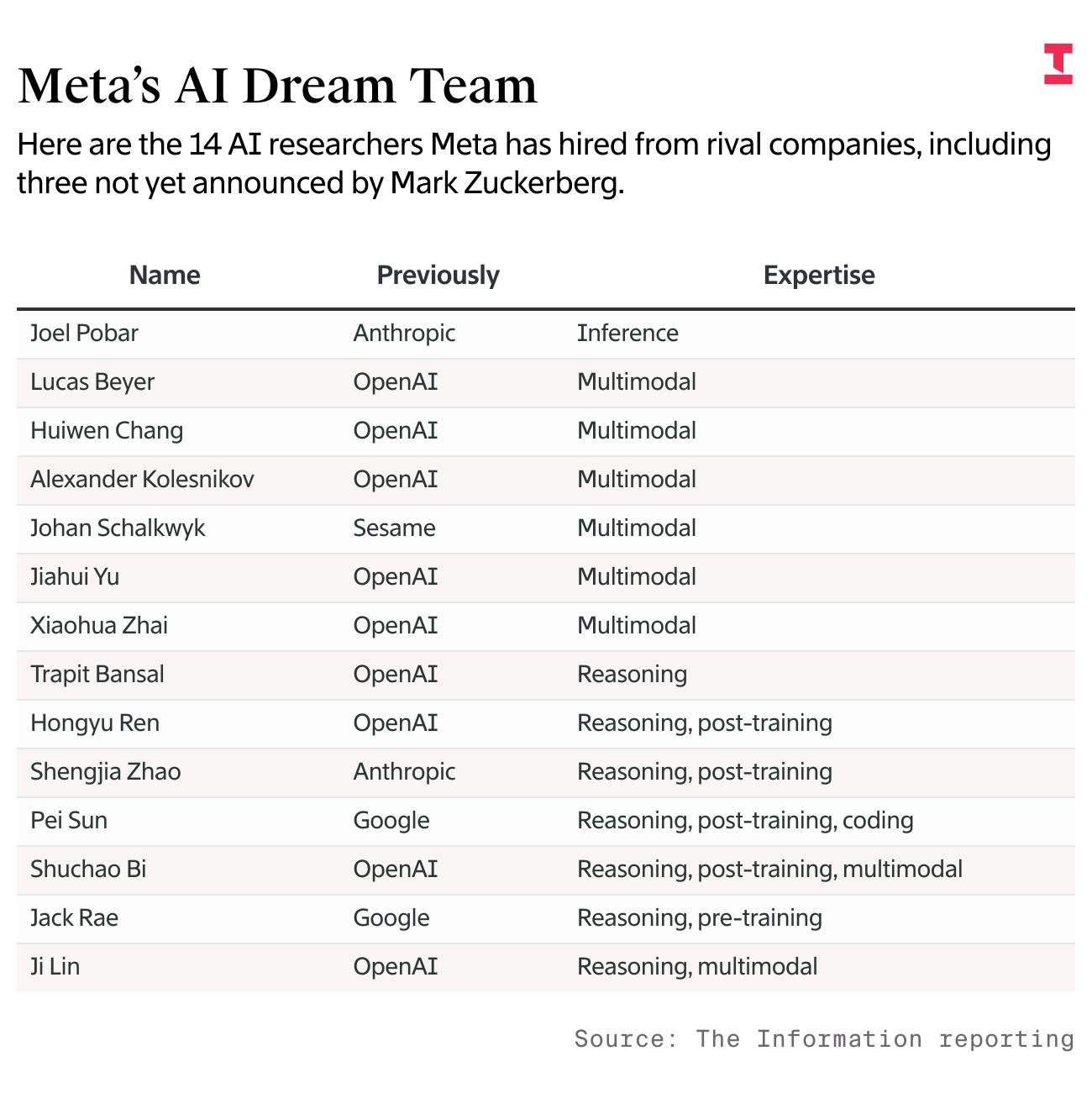
AI: AGI to ASI to Superintelligence… RTZ #774
The race is on to rename the Rose. In all its shades.
From the beginning, it’s been about fear vs opportunity in this AI Tech Wave. Despite all the AI Uncertainties.
Decel vs Accel, short for decelerate or accelerate. Towards an AI Nirvana, a Xanadu, a destination, some would say a mirage. The pot at the end of the AI rainbow. The one being sought by all at the moment.
For a while now it’s been AGI (artificial general intelligence), an acronym dropped casually and deathly seriously by almost every founder/CEO in essays and speeches galore. Sometimes morphed into the ‘Singularity’. Gentle or not.
Foundational AI companies had brief civil wars. Where the victors went onto to $300 billion+ valuations, and the ‘losers’ went on to raise billions and decacorn valuations (10x plus unicorns). Of course one of them was named ‘Safe Superintelligence’, the other ‘Thinking Machines’, harking back decades to the origins of ‘supercomputers’. You know, because AIs ‘Think’.
Along the way, AGI got upgraded to ASI (artificial super intelligence), however those were defined. With hotly debated timelines and deadlines.
Today it’s ‘Superintelligence’, pure and simple. Uttered as a solemn goal by none other than Meta founder/CEO Mark Zuckerberg, who seems as committed to invest tens of billions in people and material in this quest as he was for the $50 plus billion bet on the ‘Metaverse’. Also of scifi fame and dreams, like ‘Ready Player One’ and the one and only ‘Snow crash’.
Bloomberg manages well to explain it all pithily in “‘Superintelligence’ Is Silicon Valley’s New Favorite AI Buzzword”:
“AGI inflation”
They had me right there.
“Once upon a time, the smartest technologists in the world were racing to build “AGI,” or artificial general intelligence, meaning AI that is roughly as good as humans at most intellectual tasks.”
“But now, a new, even more ambitious goal is emerging among industry leaders: “superintelligence,” defined as AI that is not just at parity with most people, but even better than all humans at all tasks.”
“While superintelligence isn’t an entirely new idea in AI, and has been around for decades, it’s become increasingly popular recently among AI leaders, who view it as a more tangible goal.”
Amen.
“Earlier this week, Meta Chief Executive Officer Mark Zuckerberg thrust superintelligence into the mainstream by naming it as the key focus of his strategy to win the AI race. In his latest big pivot since the metaverse, Zuckerberg is pouring billions into building advanced AI products, including a new team dedicated to the goal of superintelligence, offering eye-popping, multimillion-dollar offers to researchers to join him in this lofty mission.”
“It’s not just Zuckerberg chasing superintelligence alchemy. Ilya Sutskever — arguably the most prominent AI researcher of his generation — named his new venture Safe Superintelligence Inc. after his dramatic departure from OpenAI.”
The term is definitely in the air.
“OpenAI CEO Sam Altman has been referencing “superintelligence” more frequently, too, and Microsoft recently positioned its latest breakthrough in AI for medical diagnoses as “a step toward medical superintelligence.”
“While there are plenty of business incentives for companies to hype up a new AI buzzword, it’s “a scientific reality,” that we are moving in the direction of superintelligence, said Yoshua Bengio, a professor of computer science at the Université de Montréal, who is considered one of the “godfathers” of the field of AI.”
With breathtaking justifications, despite the fears from the beginning:
“We already see AI systems that can speak to each other in over 200 languages, who can pass the PhD exams across all the sciences,” said Bengio. And while AI still lacks long-term planning and strategizing abilities, “the trend is, that gap is shrinking exponentially fast.”
“The advent of superintelligence presents an exciting business opportunity, but also, if all goes to plan, serious risk.”
Which then of course spills over into issues of control and power:
“The problem with superintelligence is whoever’s going to control it, is going to have a lot of power over everyone else,” said Bengio, whose new nonprofit research lab, LawZero, aims to come up with a safer form of artificial intelligence than current leading models.”
“And it might not be a human or a group of humans controlling it,” he added. “It could be super intelligent beings that do their own bidding.”
Then there’s the other side of the gallery, where yours truly currently finds himself:
“Still, many in the AI industry question if superintelligence as a term is ill-defined and overhyped.”
“For starters, the term “superintelligence,” like AGI, is imprecise: It’s unclear how capable, exactly, AI needs to be at certain tasks before it crosses the threshold from “general” to “super” intelligence. (At the level of a college degree holder? A PhD? A Nobel Prize winner?)”
And visions of form and substance embodied within them:
“Even more hazy is when we’ll reach superintelligence — particularly when there isn’t clear consensus how far we are from the preceding milestone of AGI (or if we’ve already achieved it already). Altman has said superintelligence is “close.” Anthropic CEO Dario Amodei has said that AI that is smarter than a Nobel Prize winner in most fields could come as soon as 2026 or 2027.”
“This could also be a wildly optimistic timeline; it could take decades to reach so-called superintelligence, or we could never reach it at all.”
Which leads to my favorite term above:
“There are many reasons why we might be seeing the rise of superintelligence as a popular term, said AI policy researcher Miles Brundage, who left OpenAI last year. One way to think about it is a kind of “AGI inflation,” he said, adding that the move toward a newer term might be “a reasonable update given that AGI seems closer than it did before to many people.”
“Or, superintelligence could be seen as “a response to AGI having different connotations to different people,” Brundage added, and in some cases people mean to refer to “something on the high end of those definitions.”
The other reason for the shifting definitional goalposts may be even more prosaic: attract attention of the top AI minds.
“Another reason “superintelligence” may be catching on recently — particularly in Meta’s case — is that an even bolder goal than AGI (that, and boatloads of cash) can help attract the limited pool of top-tier AI researchers who want to solve only the most ambitious technological problems.”
“The goal post keeps shifting when it comes to defining any of these words,” said Deedy Das, a principal at Menlo Ventures, who said he prefers to think about an “economic Turing Test” in which you hire a human and AI to do the same job, and there is no noticeable difference in output. “Is that superintelligence?” he said. “I don’t know, but that does seem like a reasonable goal post that’s pretty objectively defined.”
A rose by any name for now, with all their thorny issues:
“For now, what’s true is that some of the most well-funded, technologically adept companies in the world are pushing toward a goal that’s even more promising — and scary — than AGI.”
“And for everyday people, life is going on as usual. In the recent words of Altman: “Humanity is close to building digital superintelligence, and at least so far it’s much less weird than it seems like it should be.”
From my perpective, if one tries hard NOT to anthropomorphize AI as I’ve argued, and just look at this incredibly scaling technology that augments humans like bicycles made us move faster, then it may not be about ‘AGI Inflation’.
Or borrowing from Economics, may just be ‘Intelligence Disinflation’ or even ‘Intelligence Deflation’.
Getting far more done with far less by most of us in our daily lives. All eight plus billions of us over time.
Just like we did with the steam engine and then electricity.
And let the definitions and timelines sort themselves out. Since they’re most likely an infinite game. Likely spread out over decades ahead.
With the rest of the fears and dreams just turning out to be entertaining SciFi. Stay tuned.
(NOTE: The discussions here are for information purposes only, and not meant as investment advice at any time. Thanks for joining us here)













